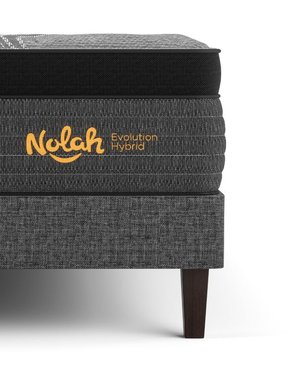Can Vitamins Help Me Sleep Better? The Best Vitamins and Minerals for Sleep
Unfortunately, vitamin deficiency is pervasive in the U.S. population. Under the guidance of your doctor, supplementing your diet with additional vitamins and minerals may boost your energy, brainpower, and combat sleep disturbances. If you’re struggling to get good quality sleep, you could be low in certain vitamins.
Always consult your doctor before starting supplementation. Talk to your doctor as soon as possible if you suspect you have a vitamin or mineral deficiency.
Symptoms of Vitamin and Mineral Deficiency
How do you know if you have a vitamin or mineral deficiency? Vitamin deficiency signs and symptoms could include:
- Chronic mouth ulcers or cracks in corners of the mouth (low iron and B vitamins)
- Bleeding gums (low vitamin C)
- Brittle hair and nails (low Biotin - B7)
- Poor night vision (low vitamin A)
- Dandruff (low zinc and B vitamins)
- Restless leg syndrome (low iron/B vitamins/and or vitamin C)
- Sleep disorders
Iron
Iron deficiency symptoms can include low energy, restless leg syndrome, cold hands and feet, headache, fast heart rate, and sleep deprivation. Low levels of iron can exacerbate feelings of stress and anxiety.
Iron-rich foods:
- Red meat
- Liver (avoid during pregnancy)
- Red kidney beans, edamame beans, chickpeas
- Spinach
- *Vitamin C helps iron absorption
Vitamin D
Vitamin D deficiency can be supplemented by spending more time in the sun and eating fatty fish. If you find that you are constantly sick with colds and flu, you feel exhausted and depressed. You could be low in vitamin D.
Vitamin D rich foods:
- Salmon
- Sardines
- Cod liver oil
- Egg yolks
- Fortified dairy products: cow’s milk and soy milk
B Vitamins
Vitamin B12 deficiency is linked to insomnia and B-Complex vitamin supplements may help combat feelings of lethargy and anxiety. B12 helps your body to create energy and improves the health of blood cells, brain function, metabolism, and energy.
B vitamin-rich foods:
- Leafy greens
- Organ meats
- Salmon
- Beef
- Oysters, muscles, clams
Vitamin C
Studies have shown that intravenous vitamin C supplements can help patients with obstructive sleep apnea to sleep better. Vitamin C is crucial to maintaining a healthy immune system and can help ease symptoms of colds and flu.
Vitamin C rich foods:
- Oranges
- Broccoli
- Strawberries
- Pineapple
- Bell peppers
Calcium and Magnesium
Calcium is essential to melatonin production (the hormone that regulate the body for sleep). Your teeth and bones will be grateful too. Calcium and magnesium may aid nighttime relaxation to help you fall asleep faster and stay asleep longer.
Calcium and magnesium-rich foods:
- Dairy products
- Sardines
- Beans and lentils
- Almonds
- Dark leafy greens
Melatonin
Your circadian rhythm works in tandem with melatonin, a naturally occurring hormone that alerts your brain to sleep. Your level of melatonin will be higher in the evening as your body prepares for sleep, and drops in the morning. Shift workers can use a natural melatonin supplement to adjust their sleep cycles or those suffering from sleep disorders.
FAQs
What Vitamins Should I Take for Sleep?
All vitamins and minerals are essential to maintaining good physical health and mental wellbeing. A multivitamin could be a good starting point but it is advisable to ask your doctor for a blood test to determine exactly what vitamins you are deficient in. A healthy body will feel at ease and help you sleep better at night. A lack of essential vitamins can lead to sleep disorders and restless leg syndrome.
What Time of Day Should I Take Vitamins?
The earlier in the day the better for vitamin absorption and release. Preferably taken with breakfast than on an empty stomach. But, depending on your lifestyle and preference, you could take your vitamin supplement at any time of day. Preferably with food if you have a sensitive stomach.
What Food Should I Eat for Better Sleep?
- Leafy greens
- Almonds
- Turkey
- Fatty fish
- Walnuts
- Oatmeal
- Bananas
What Exercise Will Help Me Sleep Better?
- Running
- Strength training
- Walking
- Swimming
- Team sports
- *3-5 times per week
Conclusion
Your sleep wake cycles can be stabilized by adding nutritious food and vitamin supplements to your diet to help your body produce the sleep hormone, melatonin. Sleep disorders, restless leg syndrome, and obstructive sleep apnea could be alleviated by topping up on missing vitamins and minerals. A simple blood test can determine what you are lacking, it is advisable to speak with your doctor before adding supplements to your diet. Healthy nutritious food, exercise, fresh air, and water are essential components to a healthy mind, body, and circadian rhythm.
Disclaimer: Nolah does not provide medical advice. All resources on the Nolah blog, including this article, are informational only and do not replace professional medical counsel. Talk to your doctor about any health, mental health, or sleep-related issues.
You May Also Like These Articles
Don't Sleep on Exclusive Offers
Sign up for our newsletter, and you'll be the first to know about discounts, deals, and what's new at Nolah.
Ready for Bed?
